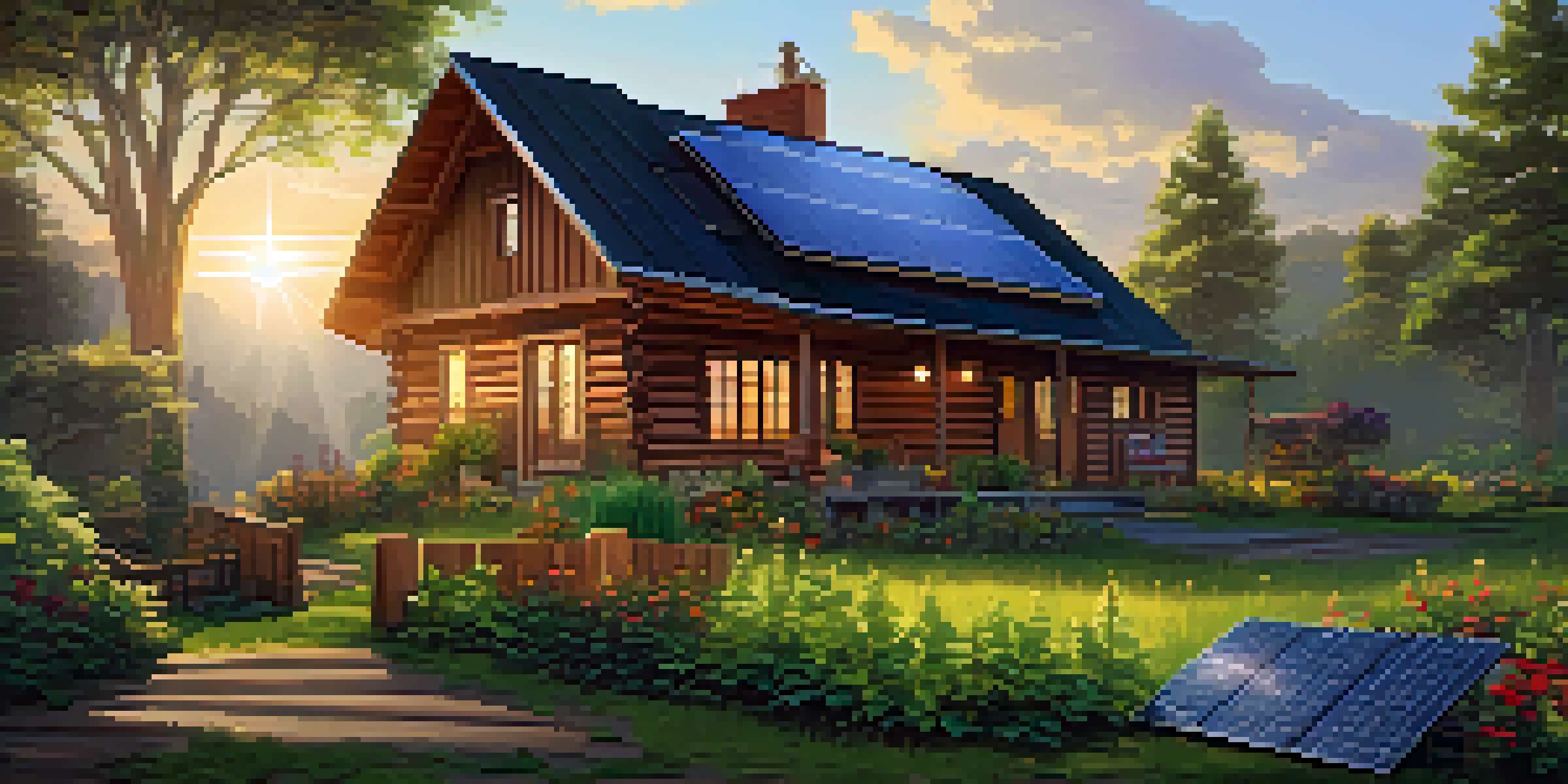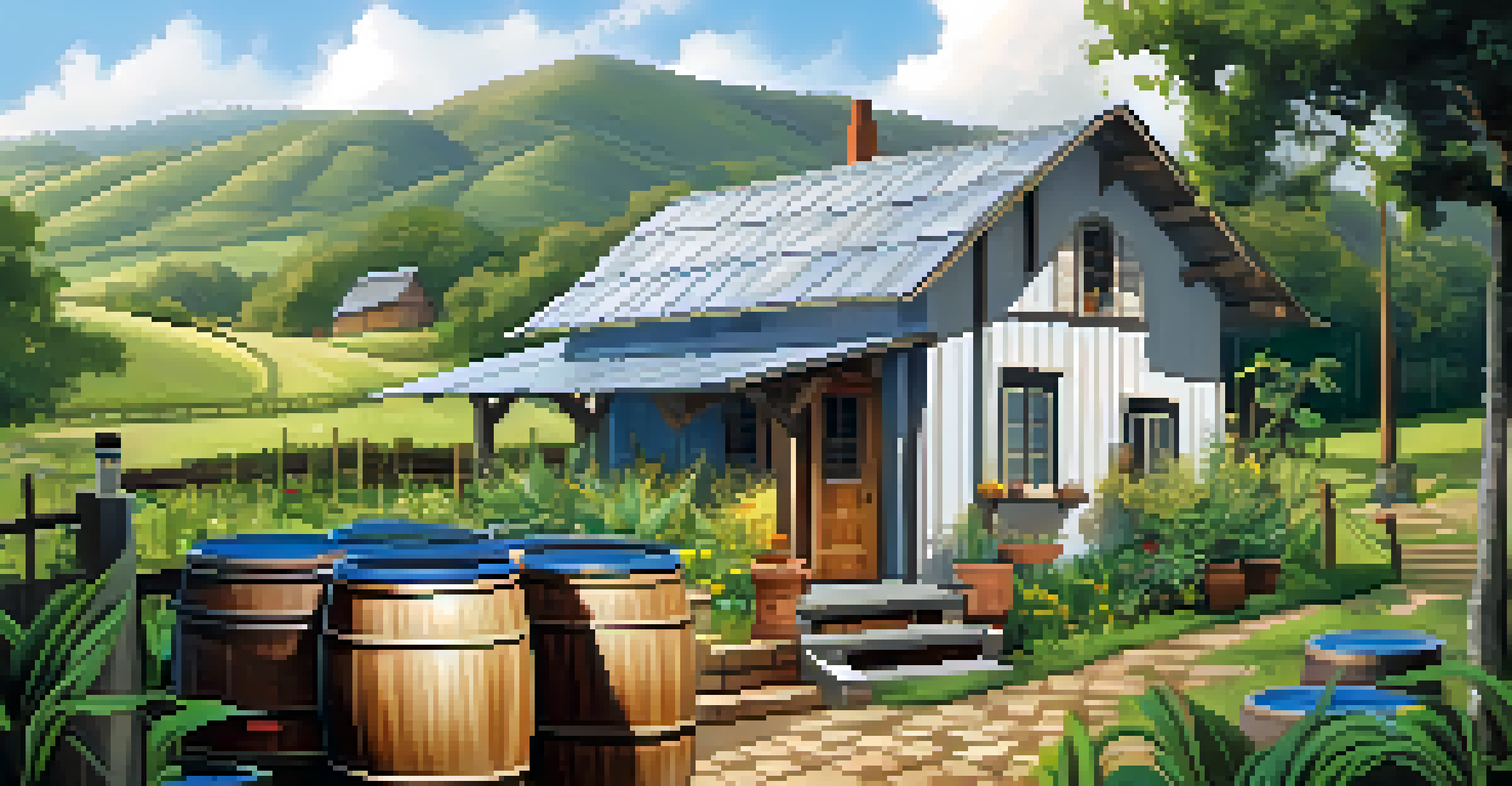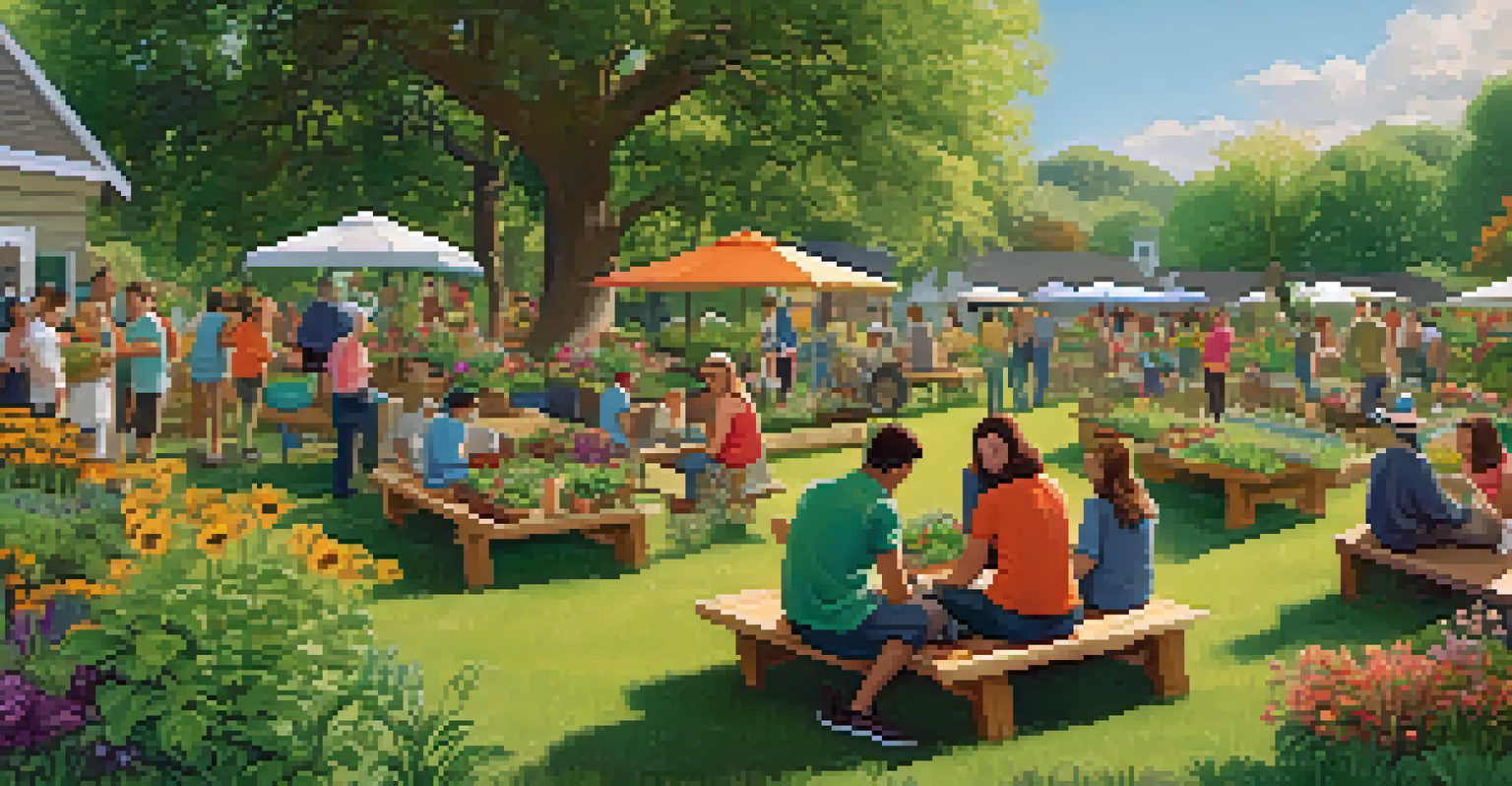Exploring Off-Grid Living Solutions for Sustainable Homes

Understanding Off-Grid Living: What It Means
Off-grid living is all about self-sufficiency, where homes operate independently of public utilities. This lifestyle emphasizes using renewable resources like solar and wind energy, making it a sustainable choice for eco-conscious individuals. Imagine a home where your electricity comes from the sun, your water is collected from rain, and your food is grown right in your backyard.
The greatest threat to our planet is the belief that someone else will save it.
The beauty of off-grid living lies in its ability to reduce your carbon footprint significantly. By harnessing natural resources and minimizing dependence on fossil fuels, you contribute to a healthier planet. It’s akin to a breath of fresh air, where you not only live sustainably but also inspire others to think about their environmental impact.
However, embarking on this journey requires careful planning and a shift in mindset. It’s not just about disconnecting from the grid but embracing a lifestyle that prioritizes sustainability, resourcefulness, and community connection. This article will explore various solutions to help you transition to an off-grid lifestyle.
Renewable Energy Sources: Powering Your Home Naturally
One of the cornerstones of off-grid living is harnessing renewable energy. Solar panels are the most popular choice, converting sunlight into electricity to power your home. Picture your roof adorned with gleaming solar panels, soaking up the sun’s rays during the day to fuel your evening activities.

Wind turbines are another option, ideal for areas with consistent wind flow. By installing a small turbine, you can generate your own electricity, much like how sailors harness the wind to propel their boats. Combining both solar and wind energy can create a robust power system that meets your needs throughout the year.
Embrace Self-Sufficiency Off-Grid
Off-grid living promotes self-sufficiency by utilizing renewable resources, reducing reliance on public utilities.
It's essential to consider energy storage solutions, such as batteries, to ensure a steady power supply during less sunny or windy days. By investing in efficient energy systems, you not only reduce your reliance on the grid but also lower your energy bills over time.
Water Harvesting: Collecting Nature's Gift
Water harvesting is a crucial component of off-grid living, ensuring you have access to clean water without relying on municipal sources. Rainwater harvesting systems collect rainwater from roofs and store it for various uses, from drinking to irrigation. Imagine a series of barrels strategically placed around your home, capturing every drop that falls from the sky.
In every walk with nature one receives far more than he seeks.
This sustainable practice not only provides a reliable water supply but also helps reduce stormwater runoff, benefiting your local ecosystem. By filtering and purifying the collected rainwater, you can enjoy fresh water while contributing to environmental conservation.
Additionally, implementing gray water systems can further enhance your water efficiency. These systems recycle water from sinks and showers for use in irrigation, creating a closed-loop system that maximizes your water resources.
Growing Your Own Food: A Sustainable Garden
Sustainable gardening plays a pivotal role in off-grid living, allowing you to grow your own food and reduce your reliance on grocery stores. Imagine stepping into your backyard and picking fresh tomatoes, herbs, and leafy greens for dinner. Not only does this provide you with organic produce, but it also connects you to the earth.
Permaculture design principles can guide you in creating a self-sustaining garden that mimics natural ecosystems. By incorporating companion planting and crop rotation, you can maximize yields while enhancing soil health. Think of it as a symbiotic relationship where plants support one another, creating a thriving garden.
Sustainable Practices Enhance Living
Implementing practices like water harvesting, gardening, and efficient waste management fosters a sustainable lifestyle.
Furthermore, preserving excess produce through canning or drying ensures you have food throughout the year. This not only promotes food security but also fosters a sense of accomplishment, knowing you are feeding yourself and your family with your own hands.
Efficient Heating and Cooling Solutions for Comfort
Maintaining a comfortable indoor temperature is vital in off-grid living, and there are numerous eco-friendly solutions available. Passive solar design, for instance, utilizes natural sunlight to heat your home during the day. Picture large south-facing windows flooding your living space with sunlight, reducing the need for artificial heating.
Wood stoves and biomass heating systems are also popular choices, providing warmth while utilizing renewable resources. Imagine cozying up next to a crackling fire, knowing that your heat source comes from sustainably managed forests.
For cooling, consider natural ventilation techniques, such as strategically placed windows and fans, to maintain airflow. By integrating these solutions, you can create a comfortable home environment while minimizing energy consumption.
Waste Management: Composting and Recycling
Effective waste management is essential for sustainable living, particularly in off-grid homes. Composting organic waste reduces the amount of trash sent to landfills and enriches your soil. Imagine transforming kitchen scraps into nutrient-rich compost that nourishes your garden, completing the cycle of nature.
Implementing a recycling system helps divert materials like glass, metal, and plastic from landfills. Setting up designated bins for different recyclables makes it easier to manage waste while fostering a culture of sustainability at home.
Community Connection Strengthens Impact
Building a community of like-minded individuals enhances the off-grid experience through shared resources and support.
By adopting these practices, you not only minimize your environmental impact but also contribute to a circular economy, where resources are reused and repurposed rather than discarded. It’s about creating a lifestyle that respects the planet and its resources.
Building Community: The Power of Connection
Off-grid living doesn't mean isolation; in fact, building a community can enhance your sustainable lifestyle. Connecting with like-minded individuals fosters a support system where knowledge and resources are shared. Imagine joining a local group of off-grid enthusiasts, exchanging tips and ideas for sustainable living.
Community gardens, tool-sharing programs, and skill-sharing workshops are excellent ways to get involved and contribute to a sustainable local economy. By collaborating with neighbors, you can pool resources and reduce individual costs, making off-grid living more accessible.

Engaging with your community also strengthens social bonds, creating a sense of belonging and shared purpose. Together, you can tackle challenges, celebrate successes, and inspire one another to live more sustainably.
The Future of Off-Grid Living: Embracing Change
As we face environmental challenges, the future of off-grid living looks promising. Advances in technology are making renewable energy sources more efficient and affordable. Imagine a world where solar panels and wind turbines are as common as traditional power lines, powering homes sustainably.
Moreover, the growing awareness of climate change is prompting more people to consider off-grid solutions. This shift in mindset signifies a collective desire to protect our planet for future generations. It’s similar to a ripple effect, where one person's decision to live sustainably inspires others to follow suit.
In conclusion, exploring off-grid living solutions is not just a trend; it’s a necessary step towards a sustainable future. By embracing these practices, you contribute to a healthier planet while enjoying the benefits of a self-sufficient lifestyle.